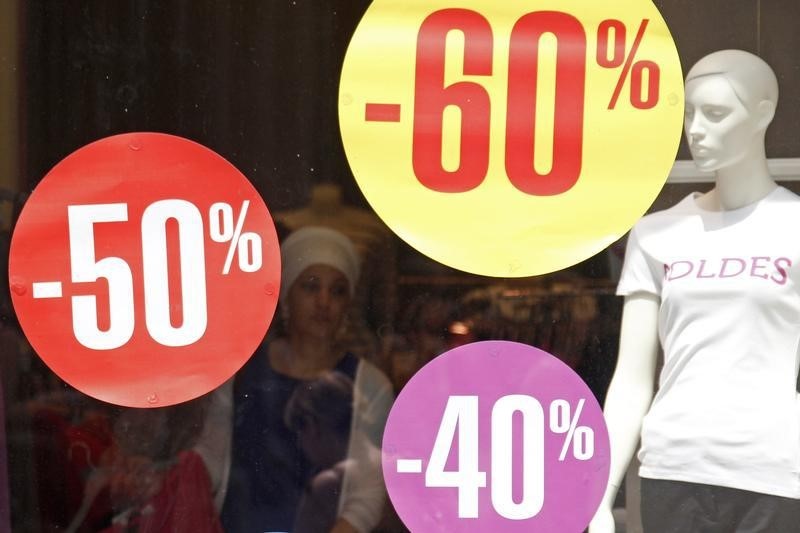By Ingrid Melander and Jean-Baptiste Vey
PARIS (Reuters) - French core inflation turned negative in November, with the first drop in the indicator since records started in 1990 pointing to a growing risk of deflation in the euro zone's second-largest economy.
That risk has become a major headache for France and the euro zone as a whole, heightening expectations that the European Central Bank will soon take more action to bolster the bloc's flagging economy.
French core, or underlying, inflation excludes the most volatile consumer prices and tax measures as well as public sector prices. It contracted by 0.2 percent from a year ago in November and by 0.1 percent month-on-month.
Headline EU-harmonised inflation remained positive, with a year-on-year rate of 0.4 percent, down from 0.5 percent in October. But this was back to its September level, itself the lowest reading since prices contracted during the global financial crisis in 2009.
"French underlying CPI now points to deflation," BNP Paribas economist Dominique Barbet said. "Keeping in mind that the annual inflation rate still includes the impact of the early 2014 VAT hike, we should expect headline inflation to fall in negative territory early next year."
Month-on-month, consumer prices fell 0.2 percent from October on lower energy and manufacturing prices, EU-harmonised data released on Thursday by the INSEE national statistics office showed.
"France: Deflation or not? That's the question," Natixis Asset Management chief economist Philippe Waechter posted on Twitter.
The European Central Bank slashed its forecasts last week for growth and inflation for the whole euro zone over the next two years. The Frankfurt-based central bank, which considers anything below 1 percent to be in its "danger zone," now forecasts an inflation rate of 0.7 percent next year.
French government officials, pressed by their EU peers to tidy up the country's public finances and step up reforms, have blamed lower-than-expected growth and inflation at home and in Europe for missing fiscal targets.
The government revised its public deficit targets for 2016 and 2017 down slightly on Thursday after announcing extra savings for 2015 to avoid EU sanctions.
The deficit will still be far higher than President Francois Hollande's first forecasts. During his 2012 election campaign he said the deficit would be brought down to 3 percent of GDP by the end of 2013 but France has since repeatedly pushed the target back. It now expects to reduce the deficit to 2.7 percent of output in 2017.
Prime Minister Manuel Valls is set to give an update on Friday of the government's reform agenda for the next two years, including plans to organise talks in January between labour unions and employer groups to cut red tape on labour laws.
"The fight against deflation must, now, be our priority. At European and national level," ruling Socialist party lawmaker Karine Berger, also an economist, said on Twitter.
BACKGROUND

French EU-harmonised inflation fell to a historical low of -0.8 percent in July 2009 and hit an all-time high of 4.0 percent in July 2008, according to INSEE's records going back to 1991.
(Additional reporting by Hannah Murphy and Julien Ponthus; Writing by Ingrid Melander; Editing by Janet Lawrence and Hugh Lawson)